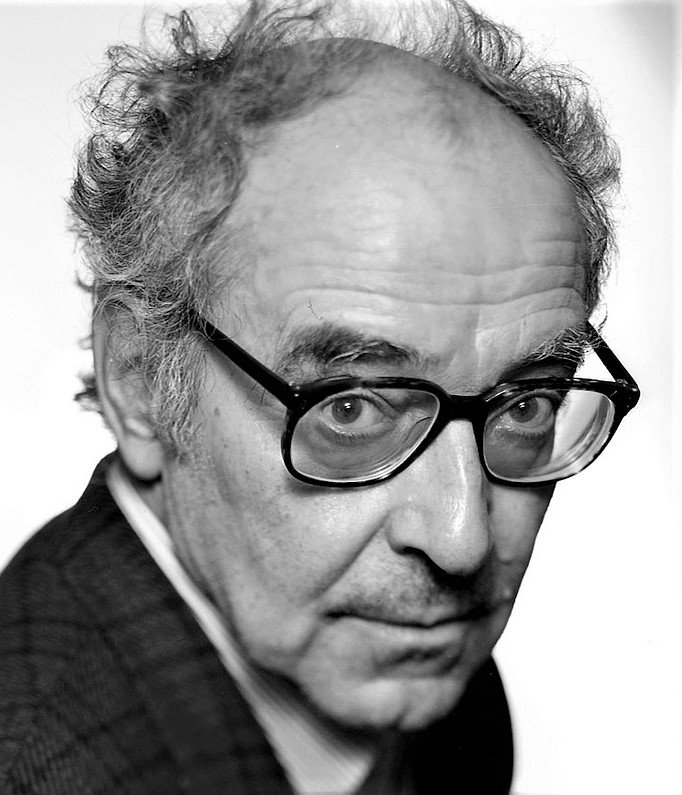JEAN-LUC GODARD
(3 December 1930 - 13 September 2022)
The Nouvelle Vague was created by a number of French film critics and cineastes in the late 1950s writing for the film journal Cahiers du Cinéma. They wished to rebel against traditional filmmaking, although they admired the work of the three Jeans, Cocteau, Vigo and Renoir, because those directors were truly the authors of their films, rather than screenwriters, producers or actors. Thus, the auteur cinema theory was born. The New Wave directors were François Truffaut, Claude Chabrol, Éric Rohmer, Jacques Rivette and Jean-Luc Godard, who were later joined by the so-called Left Bank directors Agnès Varda, Jacques Demy, Chris Marker, Alain Resnais and Henri Colpi. They all admired the work of American directors such as Hawks, Hitchcock, Welles and Ford for their fresh approach to cinema.
Whereas some of the New Wave directors concentrated on social and economic issues, they were not necessarily overtly political. Arguably the most political director was Jean-Luc Godard, the French-Swiss filmmaker, who has died from assisted suicide at the age of 91, the last of the initial ten New Wave directors. So, with his passing it is the end of an era for, between 1955 and 2018, Godard produced an exhaustive range of shorts, features, documentaries, political tracts and videos.
Never one to obey any cinematic book of rules, Godard just went ahead in his own (often outrageous) way, hellbent on forcing his outlook on life, whether or not his audience was on his own wavelength. After making several shorts in the 1950s, he emerged in 1960 with his first feature, Breathless (À bout de souffle), with Jean-Paul Belmondo as a gangster and the American actress Jean Seberg as a journalist. Truffaut and Chabrol had provided the treatment of a news story but couldn’t see how to film it, so Godard took it on and it became a massive hit. It didn’t conform to any cinematic style as Godard improvised on location and introduced jump-cuts and other innovations, but its novelty value accounted for its immediate success.
Godard’s next film, A Woman is a Woman (Une femme est une femme, 1961) is arguably his most approachable, with Anna Karina (his future wife) as a stripper wanting to become a mother with the help of Belmondo. Then came Vivre sa vie with Karina in a piece about a woman’s descent into prostitution. After that Godard hardly stopped with films on the Algerian War (Le petit soldat), pacifism (Les carabiniers), Hollywood (Le mepris) with Jack Palance and Brigitte Bardot, robbery in Bande à part with Karina and Sami Frey, adultery in Une femme mariée, science fiction in Alphaville with Eddie Constantine and Karina, and criminals on the run in Pierrot le fou, with Belmondo and Karina again. Other successes for Godard included Weekend with Mireille Darc and Jean Yanne, and Tout va bien with Yves Montand and Jane Fonda.
From the 1970s onwards, Godard arguably became too politicised for his own good, although he still found a willing audience despite his unorthodox, maverick way of filming. One of his later major works was a television series Histoire(s) du cinema, eight episodes on the history of films including Une vague nouvelle. It took ten years to complete. He carried on making films and documentaries well into his eighties regardless of fashion or current styles. He won an honorary Academy Award in 2011, often swept the board in Berlin, Venice and Cannes, and at the French César awards, too, and in other festivals around the world. In all he gained over fifty wins and seventy-plus nominations.
Jean-Luc Godard was born in Paris to a French doctor and his Swiss wife from a family of bankers. After moving to Switzerland, they divorced in 1948 and Godard returned to Paris to study at the Sorbonne, but then he met the Cahiers writers who published their own Gazette du cinema followed by the setting up of their own film projects. Godard’s first wife was the actress Anna Karina (who died in 2019) and after their divorce he married the actress, writer and director Anne Wiazemsky (who died in 2017). His third partner was the director, writer and editor Anne-Marie Miéville, with whom Godard had a daughter, the actress Anne Michel.
Despite his unconventional working methods, Jean-Luc Godard was an immense influence on world cinema. He received plaudits from such major filmmakers as Antonioni, Satyajit Ray, Orson Welles, Fritz Lang, Kurosawa, Scorsese, Francis Ford Coppola, Ken Loach, Terence Davies, Robert Altman and many more. Quentin Tarantino was in such awe of him that he named his production company A Band Apart. Could there be any higher tribute to the cinema pioneer who was Jean-Luc Godard?
MICHAEL DARVELL

